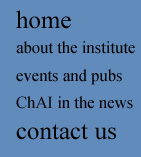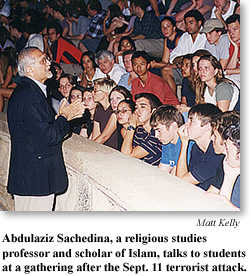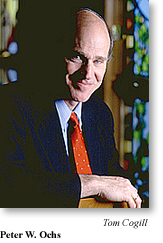
ChAI in the News

Inside UVa, October 2003
Institute seeks to foster religious exchange and understanding

And they came to the place which God had told him of; and Abraham built an altar there, and laid the wood in order, and bound Isaac his son, and laid him on the altar upon the wood.
And Abraham stretched forth his hand, and took the knife to slay his son.
Genesis 22:9-10 Bible, King James Version
What Sunday school child could forget this disturbing Old Testament passage? Jewish and Christian children alike learn the story of Abraham and Isaac, and struggle with the idea of a loving God who ordered a father to kill his son in a test of faith.
Muslim children also learn the story of Abraham and his son, but they learn a different version. As the Koran tells it, Abraham plans to sacrifice not Isaac, his second son born of Abrahams aged wife Sarah and founder of the 12 tribes of Israel, but Ishmael, his first-born son, the child of Sarahs handmaid Hagar and founder of the Arab tribes. In both versions, the son is saved from the knife at the last minute by the word of God and the appearance of a ram as a substitute sacrifice.

All three religions Judaism, Christianity and Islam share a belief in one God, are rooted in Old Testament stories and consider Abraham their patriarch. But many of the low points of human history, such as the Crusades, the Inquisition and the Holocaust, derived from the religions differences. The Universitys newly founded Children of Abraham Institute seeks to strengthen understanding among the three monotheistic religions by exploring their differences as well as their similarities, said Peter W. Ochs, Edgar M. Bronfman Chair of Modern Judaic Studies and founder of the institute.
The institute doesnt seek to change peoples religious beliefs, which we cherish, but will allow us to reach deeper levels of religious sharing, Ochs said. To our surprise, we have found that religious scholars can reach a place at the center of their different traditions that gathers them deeply and warmly together.
The institute builds on discussions that Ochs and other scholars of religion have conducted under the auspices of the Society for Scriptural Reasoning, which Ochs co-founded in 1995 with Daniel Hardy, an Anglican theologian in Cambridge, England. That loosely bound, international group of academics has met to discuss religious texts from Jewish, Muslim and Christian viewpoints at the American Academy of Religions annual conventions for the past six years.
In thinking through the scholarly discussions with colleagues at U.Va. especially Charles Marsh, associate professor of religious studies and director of the Universitys Project on Lived Theology, and Abdulaziz Sachedina, a professor of religious studies and scholar of Islam Ochs wanted to create something with a practical bent that could reach beyond academe to practicing clergy and help shape religious discussions and understanding in churches, synagogues and mosques around the world.
We want to invite religious leaders of each of the three communities to sit with our scholarly group for a few weeks and taste this deep and unexpected sharing that brings us together, he said. We hope that eventually they will be able to take that sense of deep sharing of other religions home with them. Wed like to bring them into this atmosphere to taste the possibility that enemies share the same God.
Ochs said the religious scholars realize they have much to learn from the religious leaders as well. These meetings would also enable ivory tower academics to learn about the terrible challenges economic, political and social that clerical leaders face on the ground.
The institute is sponsoring its first outreach effort on Oct. 24 at a small, private demonstration for about 50 local religious leaders in the Rotunda. The text on Abraham and his sons will be interpreted by U.Va. faculty members from Muslim, Christian and Jewish points of view. Then the audience will be invited to participate in the discussion. While not open to the public, the session will be videotaped by C-SPAN and broadcast at a later date. Other larger sessions are planned for the future.
Participants in the demonstration, along with Ochs and Sachedina, will be Elizabeth Alexander, assistant professor of religious studies and Jewish scholar; Eugene Rogers, associate professor of religious studies who teaches Christian theology; Alison Milbank, professor of English and religious literature; Basit Koshul, a Sunni Muslim scholar and doctoral candidate in religious studies working with Ochs; and Brantley Craig, a doctoral candidate in religious studies and active participant in the Society for Scriptural Reasoning.
Face-to-face meetings among people of different religious traditions and cultural backgrounds should provide a way to dispel harmful and misleading images transmitted by the world media, said Koshul. Television overseas shows as distorted a view of American culture as the American media portrayal is of Islam, he said. Before I went to a meeting of the Society for Scriptural Reasoning four years ago, I didnt know there were Jews and Christians like this.
With the new institute, said Sachedina, We have made a commitment to see that people of different traditions appreciate others and learn to live in peace and harmony with each other. We want to take this message to places where violence and conflict are and tell them what it means to be children of Abraham.
Added Ochs: I hope to live long enough to experience the shared presence
of God by Christian, Muslim and Jewish religious leaders from around the
world.
Charlotte Crystal
Time Magazine
Such rapprochement, especially involving Muslims, has been trickier in
the past 12 months. Interfaith advocates say that after the attacks, many
plans for Jewish-Muslim conversations fell through. One group that bucked
the trend was the Children of Abraham Institute, a Charlottesville, Va.,
association that organizes intensive three-way scriptural studies modeled
on Abraham's hospitality to the strangers at his tent. It has held meetings
in Denver and at England's Cambridge University and has sent representatives
to lecture in Cape Town, South Africa, and parley with imams in Malaysia.
It has the ear of the incoming Archbishop of Canterbury. At one of its
gatherings last October, University of Virginia professor of Islamic studies
Abdulaziz Sachedina expressed an interfaith ideal when he contended that
people of faith can "control" their respective interpretations
of Abraham's story "so that it doesn't become a source of demonization
of the other."
Published: Sep. 30, 2002
The Legacy of Abraham
"He is beloved by Jews, Christians and Muslims. Can this bond stop them
from hating one another?"
By David Van Biema
The Cavalier Daily
Children of Abraham Institute to foster unity
In the two weeks since terrorist attacks jarred the nation, the University has seen uncommonly high levels of dialogue between different religious groups.
Now, religious studies professors Peter Ochs and Abdul-Aziz Sachedina are trying to create an international institute that would establish a permanent base for this sort of inter-faith cooperation, benefiting both the University and the international community.
The organization, dubbed the Children of Abraham Institute, would bring together an international group of scholars and religious leaders of the Jewish, Christian and Muslim faiths to study together. The eventual goal is to have these leaders spread inter-faith understanding to the world population.
Published: Thursday, September 27, 2001
By Chris Wilson
Religion and Ethics Newsweekly
Williams: Theologian Peter Ochs established the Children of Abraham Institute, which brings Christian, Jewish, and Muslim leaders and scholars together over Abrahamic texts searching for common ground.
Mr. Ochs: There is one thing that we share profoundly, identically, and passionately. We believe in one God, Creator of Heaven and Earth, who sent Abraham into the world. We all believe that. If we were in the same room and much angrier in debate, but recognized our use of the same texts to adjudicate our differences, I think we would find a root to solution.
Air date: October 4, 2002
Episode number 605
Religion & Ethics Newsweekly is a television newsmagazine aired
on PBS. Religion & Ethics Newsweekly, hosted by veteran journalist
Bob Abernethy, is the only national TV newsmagazine program devoted entirely
to the news of religion and spirituality, and major ethical issues.
Transcript of the program ... Religion and Ethics Newsweekly
The Cavalier Daily
Religious institute expands overseas
What began as a group of religious scholars of different faiths gathering together to study scripture is now seeking to ease religious tensions across the world.
The Children of Abraham Institute, which was founded at the University and Cambridge University in January of 2001, has since extended its reach both to the international stage and to university curriculums.
In January 2001, Religious Studies Prof. Peter Ochs helped found CHAI as a political outreach of a preexisting group, the Society for Scriptural Reasoning. SSR brought scholars of the Abrahamic faiths -- Judaism, Christianity and Islam -- together to study sacred texts from the three religions.
CHAI was founded once some of the members of the SSR realized their group potentially could facilitate peace agreements as well.
Published: November 12, 2002
By Karin Agness